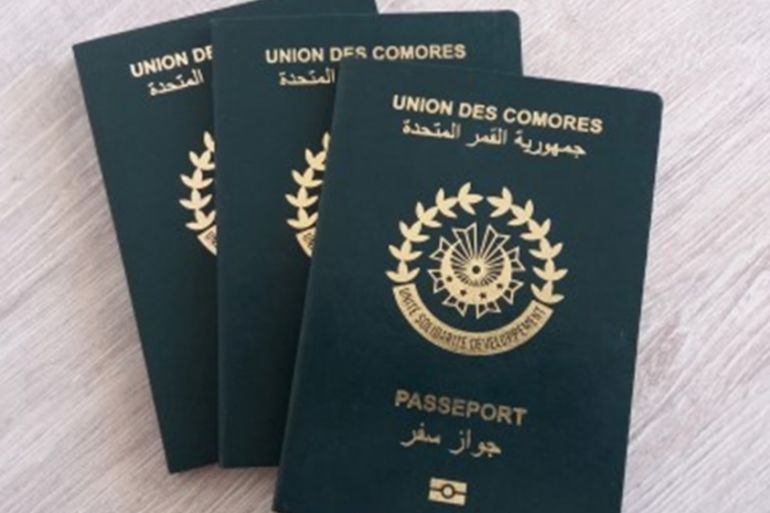Comoros passports abused by ‘mafia’ networks
The commission’s report said that nearly 48,000 foreigners – mostly Bidoons – received passports.

A programme to sell Comoros Islands citizenship resulted in thousands of passports being sold outside official channels via “mafia” networks and up to $100 million of revenues went missing, according to a report by Comoros Islands’ parliament.
The programme was flawed from its inception and the current Comoros government should seek international help to recover the missing funds and take officials involved to court, the report concluded.
Citizenship scheme
-
Nearly a decade ago, Comoros launched a programme with the United Arab Emirates and Kuwait to sell citizenship to stateless people in those countries, known as Bidoon, in return for cash to help develop the Indian Ocean archipelago.
-
The first phase of the scheme was meant to earn Comoros $200 million in return for giving citizenship to 4,000 stateless families.
-
After a brief suspension, the scheme was continued in 2011. A new agreement set the price of a passport at 4,600 euros ($5,700), and said a minimum of 5,000 passports would be issued.
-
The current Comoros government, led by President Azali Assoumani, has said it has suspended citizenship sales since coming to power in May 2016.
Ex-presidents accused
-
Funds abuse: The report said former presidents Ahmed Abdallah Mohamed Sambi and Ikililou Dhoinine, who were in power when the alleged abuses took place, were “suspected of the embezzlement of public funds”.
-
Sambi: In a video posted on Facebook, Sambi rejected all accusations against him, saying they had been fabricated to discredit him. He didn’t respond to a request for further comment.
-
Ikililou told Reuters by telephone that he could not comment on the report as he had not read it yet.
Missing funds
-
The parliamentary commission estimates that the overall sum of government revenues from the passport sales to have gone missing amounts to around 17 percent of the country’s gross domestic product in one year.
-
The commission said that the secrecy of contracts, lack of documentation and variety of groups of officials involved in passport sales complicated efforts to establish how much money went missing.
-
However, by analysing the number of passports issued without official approval and the shortfall in revenues from those sales that were approved, the commission estimated an overall revenue gap of about 43 billion Comoros francs ($100 million).
-
“The economic citizen programme generated significant financial resources. Sadly, a big part of the funds generated never arrived in the state coffers,” the report concluded.
Complicity
-
According to Comoros law, sales of citizenship to a foreigner must be authorised by the president.
-
The commission said that a database showed that nearly 48,000 foreigners – mostly Bidoons – received passports, about 6,000 more than the official number approved by the president, highlighting the scale of sales outside the official channels.
-
The high volume of passports being issued meant that the top Comoros security official’s signature was scanned and shared on the government’s computer system, scrapping the need for him to manually sign off on each individual document, according to the report.
-
“This allowed for the emergence of parallel mafia networks selling Comoros passports,” the report said.
-
“The at least tacit complicity of authorities at the highest levels with the parallel networks inside and outside the country has turned the Comoros passport into a product advertised for sale on the international market.”
Next steps
-
Unofficial report: The report was completed in December but has not been publicly released. Reuters has reviewed a copy that was signed by Dhoihir Dhoulkamal, head of the commission and an independent member of parliament.
-
Abdallah Tocha Djohar, initially on the commission who later called for it to be disbanded, said the report had not been officially approved by the entire commission and its disclosure violated procedures relating to how the commission should operate.
-
Parliament debate: The commission’s report is due to be debated in parliament when the next session begins in April.
-
A spokesman for Assoumani said that the president had not yet received a copy but the president would analyse the findings.
- “If some people are found to have embezzled money or broken the law, there is no doubt that steps will be taken to establish who is responsible,” Mohamed Ismaella, Assoumani’s spokesman said.